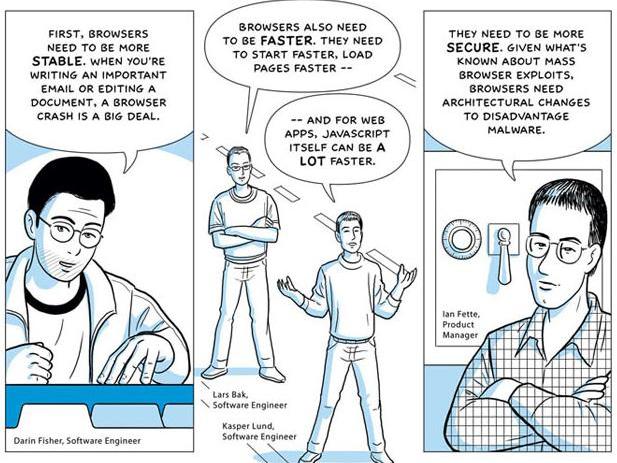Google Chrome: interview with artist, Scott McCloud
Google week: Google comic book artist speaks

After fronting Google's surprise launch of Chrome with his explanatory comic book earlier this week, TechRadar grabs an exclusive chat with Zot!, Destroy!!! and
Understanding Comics
creator Scott McCloud about his work with Google, his life in comics and his plans and aspirations for the future.
When did Google first approach you to do the comic for Google Chrome?
It was during this year – I think it may have been February or March, and we had some discussions about what shape it might take. Eric Antonow at Google had the notion that comics might be a good way to explain Chrome and he had had me up to speak there in august of 2007, and he was familiar with my work so he thought I might be an appropriate person for the job.
It was at the very beginning…it was just a fairly vague idea; we weren't entirely sure what shape it would take, how extensive it would be, how technical and these were things that we just gradually settled on in discussions. And then we conducted extensive interviews with about 20 engineers, and those interviews became the basis for the comic.
So from these interviews, were you then able to write the script yourself?
Get the best Black Friday deals direct to your inbox, plus news, reviews, and more.
Sign up to be the first to know about unmissable Black Friday deals on top tech, plus get all your favorite TechRadar content.
I wrote the script, though of course the words are the engineers' words. They've been condensed considerably and edited for grammar and readability [laughs], but the tricky part was just combing through the tens of thousands of words that we had transcripts for, and selecting what were the salient points. And I had lots of help with the transcription and with tagging certain parts of the text that we thought were more promising than others, and there were a team basically of 3 of us who worked on this together, but in the end the actual crafting of the final script…I was given a lot of latitude to do that on my end, to find an organic, fairly natural flow of ideas.
Apart from you, who was on this team of three?
Well Eric Antonow had got me onto the team, and he was present for the brainstorming sessions, and then down in the trenches in the late stages I had a lot of help from Anna-Christina Douglas and Mark Sabec, and especially in the late stages of the project they were a tremendous help, sometimes just in the practical business of transcribing these conversations. Because the project was top secret, we couldn't just farm it out [laughs] – a lot of that had to be done in-house by a very small team.
How long did it take to work on and finish the comic?
Well, of continuous work it was probably about 10 weeks or so, but it stretched out on and off over the course of 4 or 5 months or so.
What were the most difficult idea/ideas from the devs you spoke to actually explain in a comic format?
You know it's funny – a couple of the most difficult ones wound up actually being esoteric enough that we all agreed at the end that they probably didn't belong. I came up with a visual explanation, for example, of the proxy and stub protocol for getting plug-ins to talk to their renderer at a distance, which in the end just seemed unnecessarily technical, but I was very proud of the diagram [laughs]. I was sad to let it go! Although I agreed that it probably needed to go in the end – it wasn't necessary.
Do you think you'll ever release any of the parts that were "cut" to readers in the future?
It's tempting, although I think at this point the comic seems to be doing its job quite well without that sort of thing. But it was interesting to see how far we could push the technical side. It's not that I couldn't explain something like that - I think that in the end we had a pretty good visual explanation of it – it was just that in this particular project it wasn't necessary to get quite that geeky, but as a trial for future endeavours I think it's interesting that as technical as this book was, it could have been more technical, and still been readable. I think that's what we learned in the course of making it.
Most Popular

